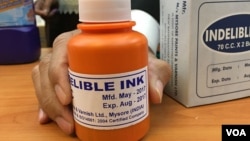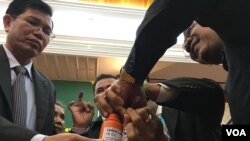The head of Cambodia’s election body has sought to downplay claims that the supposedly fraud-proof ink used to mark voters’ fingers after they cast a ballot can be removed using hair products.
Cambodia is due to go to the polls on June 4 in a hotly contested local election mired in controversy.
Opposition members recently claimed to have demonstrated that the ink, which is one of several measures the National Election Committee (NEC) says it has put in place to stop voter fraud, could be easily removed using household products.
Sik Bun Hok, NEC president, admitted that the ink was partially removable, but said that other checks had been put in place to prevent people from voting multiple times in the election.
He warned that anyone claiming the ink was removable during the official election period could face legal action.
“If there is someone or some organization wanting to test the ink to undermine the election or causing chaos amid the election, the NEC will take legal action against those people or organization,” he said.
Morn Phalla, an opposition councilor in Phnom Penh, called on the NEC to use a better quality of ink to stymie possible accusations of fraud.
The NEC in April chose to order almost 50,000 bottles on the ink from an Indian company, paying some $800,000 for the product. The same ink was used in previous elections, which were marred by serious allegations of voter fraud.
Yoeung Sotheara, a legal observer with election monitoring group Comfrel, warned that there were deeper issues at play that should raise alarm bells for those seeking a fair election. “Bribery is systemic sometimes. How can we resolve it?”
Almost 8 million people have registered to vote in the forthcoming commune council elections on June 4.








